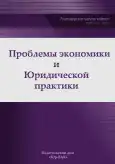Regulatory Considerations for Smart Contracts in the USA
- Autores: Petrakova E.P.1
-
Afiliações:
- Saratov State Law University
- Edição: Volume 19, Nº 1 (2023)
- Páginas: 164-171
- Seção: Private Law (Civil) Sciences
- URL: https://journal-vniispk.ru/2541-8025/article/view/250123
- ID: 250123
Citar
Resumo
The article is devoted to the analysis of the legal regulation of smart contracts in the United States of America. A smart contract is a completely new phenomenon for both Russian and foreign law, presented in the form of a computer code that automatically executes all or parts of the agreement and placed on a platform being built using blockchain or distributed registry technology. The author analyzes US law to determine whether smart contracts can be deemed enforceable legal agreements under contract law in the United States, and whether they satisfy the elements of the contract under the United States contract law. The purpose of research is to analyze the legal regulation of smart contracts of the various US states to identify existing approaches to the definition of a smart contract and its legal nature. The subject is the US legislation and the legislation of the states providing the legal regulation of civil law relations related to the use of smart contracts and blockchain technology. Results. Based on the analysis of the legislation of the states, which have included in their statutes the legal definition of a smart contract and blockchain, the author has identified two points of view on the definition and legal nature of a smart contract. The difference of approaches to the definition of a smart contract and the legal nature underlying the accepted definitions indicates the lack of a uniform legal concept of smart contracts in the United States, which would include a combination of technical and legal features inherent in this phenomenon. As a result, there may be increased pressure on the certain states with the aim of passing statutes which would provide uniform definitions reflecting the development of blockchain and smart contracts.
Texto integral
##article.viewOnOriginalSite##Sobre autores
Ekaterina Petrakova
Saratov State Law University
Autor responsável pela correspondência
Email: kate.zlo@mail.ru
Graduate student
Rússia, SaratovBibliografia
- Bauman R. W. Ideology and Community in the First Wave of Critical Legal Studies [Electronic Resource] // Toronto: University of Toronto Press, 2002. URL: https://archive.org/details/ideologycommunit0000baum (date of access: 05.02.2022).
- Corkery M., Popper N. From Farm to Blockchain: Walmart Tracks Its Lettuce [Electronic Resource] // N.Y. Times, 2018. URL: https://www.nytimes.com/2018/09/24/business/walmart-blockchain-lettuce.html/ (date of access: 05.02.2022).
- Cornell N., Werbach K. Contracts Ex Machina [Electronic Resource] // Duke Law Journal, 2017. Vol. 313. P. 340–342. URL: https://scholarship.law.duke.edu/dlj/vol67/iss2/2/ (date of access: 05.02.2022).
- Gatteschi V., Lamberti F., Demartini C. Technology of Smart Contracts [Electronic Resource] // The Cambridge Handbook of Smart Contracts, Blockchain Technology and Digital Platforms, 2019. Vol. 37. P. 45–53. URL: https://edisciplinas.usp.br/pluginfile.php/5552472/ (date of access: 05.02.2022).
- Miller G. Blockchain Valley: Wyoming is Poised to Become the Cryptocurrency Capital of America [Electronic Resource] // Newsweek, 2018. URL: https://www.newsweek.com/wyoming-cowboy-state-poised today-become-blockchain-valley-828124 (date of access: 05.02.2022).
- Scholz L.H. Algorithmic Contracts [Electronic Resource] // 20 Stan. Tech. L. Rev. 128, 2017. P. 157. URL: https://law.stanford.edu/wp-content/uploads/2018/03/3_SCHOLZ-FINAL_Formatted_Mar18.pdf (date of access: 05.02.2022).
- Summers R.S., Hillman R.A., Hoffman D.A. Contract and Related Obligation: Theory, Doctrine, and Practice [Electronic Resource] // St. Paul, MN: West Academic Publishing, 2016. P. 403. URL: https://archive.org/details/contractrelatedo0000summ_i5o8 (date of access: 05.02.2022).
- Szabo N. Smart Contracts [Electronic Resource] // Phonetic Science Amsterdam, 1994. URL: http://www.fon.hum.uva.nl/rob/Courses/InformationInSpeech/CDROM/Literature/LOT/wintershool2006/szabo.best.vwh.net/smart.contracts.html (date of access: 05.02.2022).
- Szabo N. Formalizing and Securing Relationships on Public Networks [Electronic Resource] // Satoshi Nakamoto Institute, 1997. URL: https://nakamotoinstitute.org/formalizing-securing-relationships (date of access: 05.02.2022).
Arquivos suplementares








